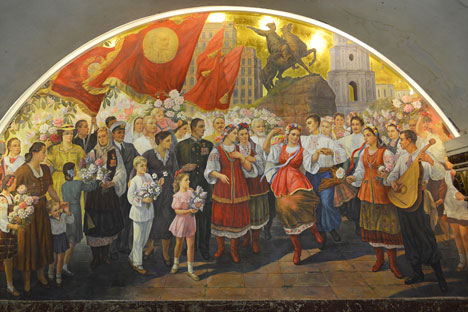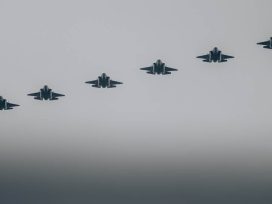Hybrid reconciliation
It seems that, subsequent to the “hybrid war” between Ukraine and Russia, reconciliation efforts have ensued – but only at first glance. In fact, what we witness is a continuation of war by other means, writes Tatiana Zhurzhenko. Mapping the growing alienation between the two nations, she asks: under what conditions is dialogue possible?
More than a year since the ceasefire in Donbas, there is no political solution in sight for the war-torn region of eastern Ukraine, and the situation seems to drift towards a “frozen conflict” scenario. Moscow pushes for the implementation of the political part of the Minsk agreement (local elections, full amnesty, and autonomy for the separatist-controlled territories of Donbas), while Kyiv is becoming increasingly reluctant to fulfil its part of the deal before it regains control over the border with Russia. Meanwhile, the embattled territories are turning into a lawless grey zone with a local population left in limbo and deprived of any perspective for the future. The theme of the “Ukraine crisis” has almost disappeared from the Russian media, especially now that the military operation in Syria has captured domestic public attention.

Mosaic (1954) in Kievskaya metro station, Moscow, honouring the 300th anniversary of the unification of Ukraine and Russia.
In this sudden silence, which follows months of anti-Ukrainian hysteria and hate speech, voices calling for “brotherly love” and evoking a “common historical destiny” have become louder. Ukrainians and Russians, we can hear, are brotherly people and the conflict between them has been fomented by the United States, the European Union and NATO. Two Slavic peoples will always understand each other, whereas the mercantile Europeans only seek to exploit Ukrainians as cheap labour and will never consider them equals. President Putin also stressed on several occasions that Ukrainians and Russians are the “same people” and “basically one ethnos”. In a by now almost routine Surkovian manoeuvre,1 several “grassroots reconciliation initiatives” were launched to revitalize the “brotherly love” between Ukrainians and Russian. One example is Druzhba Narodov (“Peoples’ friendship”). On its website, which has a Russian domain, the initiators of what they call a “Ukrainian movement” blame politicians in Kyiv for the conflict with the friendly neighbouring state of Russia, claiming that “we are trying to prevent a tragedy of Ukrainians and Russians killing each other. We are brotherly folks, we are of the same blood, and we are the same people”. Another site launched a couple of months ago with the telling web address we-are-one.ru publishes “voices of ordinary people” from both Ukraine and Russia under such banners as: “One people, one history! Enough politics! Enough propaganda! Enough tonnes of hatred in social networks! Russians and Ukrainians are brothers!” This website was created by the Russian PR agency “Perfect Raise”. Some Ukrainian analysts compare these efforts to similar Russian activities in Georgia after the “five-day war” in August 2008, when various pseudo-grassroots initiatives were launched to imitate a “dialogue” and intensify the pro-Russian sentiment in Georgian society.2
It seems that, subsequent to the “hybrid war” between Ukraine and Russia, reconciliation efforts have ensued – but only at first glance. In fact, what we witness is a “hybrid reconciliation” which is just the next operation in an ongoing war.
“Dialogue and reconciliation” is of course not just a political technology of the Kremlin – it corresponds to current trends in Ukrainian and Russian societies where people are tired of the emotional mobilization and information wars of the last two years. This new tone sounds appealing to many Russian liberals who sympathized with the Maidan protests and used to go to peace marches against the war in Ukraine. The Forum of the Ukrainian and Russian intelligentsia, held in April 2014 in Kyiv and initiated by Mikhail Khodorkovskiy, was a demonstration of such solidarity. But as the military conflict seems to be over and the political legacy of Maidan drowns in persisting corruption, the moral clarity of an “aggressor vs victim” logic is becoming blurred. The language of “dialogue” and “reconciliation” takes the place of the language of responsibility and guilt that never had a chance to develop in the Russian public space. Ironically, the old Soviet “brotherly friendship” appears to be the only available political vocabulary for starting a dialogue with Ukrainian society.
The message of reconciliation offered to Ukrainians, who are humiliated by military defeats and frustrated with their new/old corrupt politicians, generates a rather mixed response. It is of course appealing to some parts of the Ukrainian population, people who have never considered the conflict in the east as a display of Russian military aggression. Moreover, a normalization of relations seems natural and desirable to many on both sides of the border, from ordinary people to various professional communities. And yet, politically engaged Ukrainians meet the offer of reconciliation with some reservations – and not because of Russophobia or nationalist sentiment. They feel that Russians, even those immune to anti-Ukrainian hysteria, have not quite understood what happened to Ukraine in the last two years. As Ukrainian journalist Pavel Kazarin noted in his column,3 for Russian society the war in Ukraine was largely virtual and experienced mainly in the media and social networks. Those who participated in this war from the Russian side are forced to keep silent. However, Ukrainians in all parts of the country encountered the conflict at a personal level – they or their close relatives and friends were drafted to the army, others joined various volunteer groups, around one and a half million civilians were displaced, thousands were killed and wounded. The martyrdom of the Heavenly Hundred, the collective trauma of the war and the new memorial cult of the defenders of Ukrainian independence make it impossible for Ukrainian society simply to “forget and forgive”.
European recipes for Ukraine
The new discourse on reconciliation echoes the numerous appeals to Ukrainians and Russians to “develop a dialogue”, “avoid the language of hostility” and “fight the mutual stereotypes” that can be heard so often at international conferences and public debates in Europe. Post-Cold War Europe believes in reconciliation as an indispensable instrument of peace-making and a universal moral value. From today’s perspective, the European Union appears to be a success story of the reconciliation politics that allowed Europe to overcome the hostilities of World War II, and later the Cold War division of the continent. French-German reconciliation laid the ground for peace in a Europe exhausted by two world wars and gave impetus to the integration process. And German-Polish reconciliation, which had already started during the Cold War era with the famous “Pastoral Letter of the Polish Bishops to their German Brothers”, paved the way for EU eastern enlargement in 2004. Though marginal for the European context in general, the success of Polish-Ukrainian reconciliation inspired by the ideas of Jerzy Giedroyc and the Polish émigré magazine Kultura seems to prove the universality of reconciliation as an instrument for overcoming hostilities and collective traumas of the past.
The war in former Yugoslavia shocked Europeans as a relapse into archaic brutality and mass violence after decades of relative stability and peace, in stark contrast to the non-violent fall of communist regimes in East-Central Europe. It also strengthened the conviction that peace is something to be preserved at any price and that military conflicts emerge from intolerance to cultural differences, from ethnic stereotyping and the dehumanization of “others”. Last but not least, civic education in most European countries is based on the universal lesson learnt from the Holocaust, which teaches citizens that fighting cultural stereotypes and banning hate speech are ways to prevent or resolve conflicts.
Can these proven European recipes help in the Ukrainian case? It is important to understand that the success of the culture of reconciliation, which has become the foundation of postwar Europe, is based on the will to recognize the political subjectivity of the other. And this is where the French-German, German-Polish and even Polish-Ukrainian cases differ from the Ukrainian-Russian one, as the will to recognize Ukraine is absent on the Russian side.
In the nineteenth century, Ukraine became an indispensible part of an emerging Russian identity. It was not just a “normal” colony of the Russian empire but a constitutive element for the metropolitan centre. Contemporary Russia’s elites and society are still suffering from the phantom pain caused by Ukraine’s independence, and are unable to accept its implications, including the right of Ukrainians to decide their own political future. In the Russian political imagination, Ukraine is not a political subject but an arena of contestation among geopolitical players. And the new subjectivity of the Ukrainian people born in the fire of the Maidan revolution is something that the Kremlin is even less able to accept – this would question the very nature of the social contract on which the current Russian regime is based.
Neither does Ukraine’s continuing anti-colonial fight fit the ethos of post-imperial Europe, which believes in dialogue, international agreements and the rule of law. The latter has first to be restored in the eastern European “bloodlands” before any talk of reconciliation is possible. As one of Ukraine’s leading foreign policy experts, Oleksandr Sushko, summarized his impressions after the Munich conference on international security in February 2016:
It is difficult to object to Austrians and Finns, whose territory Russian soldiers left practically voluntarily and whose belief in Moscow’s ability to negotiate is based on experience. However, Ukraine did not merely have a “strategic partnership” with Russia, but a most comprehensive system of bilateral agreements which included “friendship and cooperation”, multiple confirmations of the official recognition of sovereignty and state borders, a treaty which allowed Russian Black Sea Fleet to be based in Sevastopol until 2042, a special [liberalized –TZ] border regime, decades of free trade and a lot more. So for Ukraine it is difficult to understand mantras about the necessity of a new dialogue and new agreements with those who have demonstratively neglected the treaties already signed. Those who did not experience the perfidiousness of the “brotherly people” will not understand the psychological trauma it inflicted.4
The parallel with the war in former Yugoslavia,5 seductive as it is, does not work either. After two years of military conflict there is just as little that is ethnic about it as when the conflict first begun, on the day President Putin asked (and received) the Russian Duma’s permission to use military force on the territory of the neighbouring sovereign state. The war has not emerged from any pre-existing mutual hostilities between Ukrainians and Russians, but from fatal political decisions taken in Moscow. And despite two years of armed conflict, the dividing lines have not become ethnicized: what is at stake here is still about political principles, values and visions of the future rather than identities and cultural markers. Aggression cannot be stopped by seminars on tolerance and conferences on reconciliation. True, dialogue is always good, but Ukrainians legitimately want to preserve their new civic identity and should not allow this dialogue to be depoliticized. In other words, they should not fall into the old trap of the language of “brotherly love” (what, by the way, could be more ethnic than “Slavic brotherhood”?) but create and protect their own civic vocabulary. This quest for a new language was recently formulated by Russian journalist Maxim Trudolyubov:
Whatever the linguistic ties between Russia and Ukraine, the words we share no longer have the same meaning. The vocabulary of the state is fading. If the two countries are to forge a new understanding, we must negotiate using the language of civility, one that can be spoken in any tongue – be it Russian, Ukrainian, English or German – with far less danger of our words being lost in translation.6
A long goodbye
Before we speak about dialogue and reconciliation we should first understand the nature of the conflict between Ukrainian and Russian societies, and the resulting process of their growing alienation. How did Maidan and Russian intervention in Ukraine affect the mutual perceptions and common representations of the two nations?
While the Russian-Ukrainian armed conflict is a fairly new development, which some commentators see as a symptom of the ongoing dissolution of the Soviet Union 25 years after its official death, narratives framing this development on both sides are not totally new. Back in 2010, I analysed both Russian and Ukrainian discourses about the collapse of the Soviet Union, mutual perceptions of the new neighbour state in Ukraine and Russia and common attitudes towards the Ukrainian-Russian border.7
Russia
In Russia before Euromaidan, three major types of discourse on Ukraine could be found: 1) neo-imperialist, 2) nationalist and 3) liberal ones. The (neo-)imperialists considered Ukraine (with the exception of its western regions) an integral part of Orthodox / East Slavic / Eurasian civilization. They assumed that Ukrainians share cultural and religious roots with Russians and are united by centuries of “common history” – a view developed in Russian historiography during the nineteenth century. The point of departure for nationalist narratives was the fact that Russia and Ukraine have split for good, with Ukraine presented as an agent of external influence, as a Trojan horse of the West in the traditional zone of Russian geopolitical interests. Long before the current conflict, Russian nationalists voiced claims to parts of Ukrainian territory (first of all to Crimea but also to the south-eastern regions) and spoke in the name of local ethnic Russians as alleged victims of forceful Ukrainization. Finally, the rather marginal liberals did not consider the pro-European aspirations of Ukraine a threat to Russian national interests, but were in general scarcely interested in the topic of Ukrainian-Russian relations.
During the first post-Soviet decade the Kremlin kept a pragmatic distance to all three discourses: having recognized Ukraine’s independence of 1991 and its territorial integrity, Moscow implicitly considered the country part of its sphere of influence. But after the Orange Revolution in 2004, which made a strong case for taking Ukrainian society and politics down a pro-European path, the hitherto pragmatic language of partnership and economic cooperation on the Russian side had already given way to a hostile political rhetoric and accusations of nationalism. The fierce memory and identity wars between the two countries were frozen with the end of the Yushchenko era, only to come back with a vengeance as Russian propaganda presented the Maidan revolution as a “fascist coup”.
After Maidan and the annexation of Crimea, the neo-imperialist and nationalist discourses on Ukraine melted together and became mainstream in Russia. While during the “Russian spring” Moscow directly appealed to ethnic Russians and Russophones in Ukraine, Russian media and politicians talked about Ukrainians as a “brotherly people” kidnapped by a nationalist / fascist pro-western leadership (“junta”). Since the annexation of Crimea, the discourse on history and identity has been monopolized and weaponized by Moscow against Ukraine (“single Slavic civilization”, “Novorossia” etc.). Under the conditions of an undeclared war, this discourse denies the political subjectivity and even the very existence of the Ukrainian nation-state. The “Ukrainian nationalists” (from this perspective, everybody defending Ukraine’s territorial integrity and the right to choose her future) are simply excluded from the imagined collective body of “Slavic brotherhood”, which spans across new and artificial state boundaries. At the same time, and paradoxically, the anti-Kyiv propaganda in the Russian media has de facto an “othering” effect, shaping the image of Ukrainians as culturally different from Russians.
The Russian liberal discourse on Ukraine, meanwhile further weakened and marginalized, treats the Bolotnaya protests of 2011 and the Maidan protests of 2013-14 as structurally similar movements. The failure of both movements has led, from the Russian liberals’ perspective, to the consolidation of autocracy in Russia and the restoration of an oligarchic republic in Ukraine, and to a nationalist mobilization in both countries. Partly admitting Russia’s involvement in Ukraine, Russian liberals usually consider the events in Donbas a “civil war” and are divided on the issue of Crimea. The “post-modernist” approach, popular among Russian liberals, relativizes the issue of territorial belonging (“multiplicity of historical narratives”, “every nation is a construct”). From this perspective, Ukrainians seeking to restore the territorial integrity of their country come across as stubborn archaic nationalists.
Ukraine
In Ukraine before Maidan, we could observe the following main discourses about Russia. Pro-Russian and Ukrainian nationalist discourses on Russia marked the opposite poles of the political spectrum. While the pro-Russian discourse drew on the concept of “civilization”, pan-Slavism and anti-western sentiments, the Ukrainian nationalist discourse operated with ethnic and linguistic categories. The mainstream political discourse in Ukraine expressed a preference for pragmatic cooperation with Russia and “European integration” as a strategic, even though distant, goal. The pro-European discourse of the political opposition and civil society considered Ukraine an integral part of Europe.
Maidan revolutionized this picture, as the pro-European discourse became central to the Ukrainian revolution. Ukrainians who took to the streets did not do so for the Association Agreement with the EU in the first place. “Europe” was understood as a political model for Ukraine, comprising a set of universalist principles such as democracy, human rights, rule of law, free speech and public control over the state. Europe was seen as a chance and a direction for Ukraine’s long-needed modernization. To cite the Ukrainian historian Yaroslav Hrytsak, Maidan was about values and not about identity.8
Until the annexation of Crimea, Maidan as a protest movement was not anti-Russian, even if some segments of it were nationalist. What changed the situation radically was Putin’s support for the ousted president Viktor Yanukovych and his people, and most of all Russia’s annexation of Crimea and military intervention in Donbas. This one-sided aggression has provoked an anti-Russian nationalist attitude in Ukrainian society. The war in Donbas has been inscribed into the centuries-long history of Russia’s imperial domination in Ukraine. Russia has reappeared as the historical enemy of Ukraine, even in the eyes of many Ukrainian liberals, while the pro-Russian discourse in the Ukrainian public space has become marginalized. In political terms, whether we like it or not, “Russia” is what Ukrainians try to leave behind on their way to Europe, and for many it stands for “Asia”, authoritarianism and the Soviet legacy. And yet, to repeat, these oppositions are not expressed in ethnic terms, just as the internal conflict in Ukraine cannot be understood in terms of ethnic hatred.
No reconciliation without Europeanization
When one day the war is over and the territorial integrity of the country is restored, Ukraine and Russia will certainly need dialogue and reconciliation on many levels, and for this they will need European experience and support. However, a lot will depend on the conditions under which peace is restored and what the political implications of the deal for Ukraine and Russia will be. If Ukraine is forced by the EU to accept territorial losses, the “autonomy” of Donbas or a new pro-Russian government, dialogue will be difficult as Ukrainian civil society will be humiliated, and frustrated with Europe. But if Ukraine, with the help of the West, succeeds in modernizing the state and strengthening its sovereignty while upholding democracy and human rights, this will certainly help to foster future reconciliation with Russia. The danger of radical nationalism in Ukraine should not be denied, though this is a threat to the Ukrainian state in the first place, not to Russia or ethnic Russians.
The good news is that Ukrainian civil society is alert and there are already multiple platforms for debates, critical analysis and dialogue, as well as initiatives preventing social exclusion and xenophobia (helping for example displaced people from Donbas to integrate). This experience could be useful later on in the Ukrainian-Russian reconciliation process. The main question is, however, whether a collective agent will emerge in Russia for such reconciliation: something that can only happen if the current imperialist-nationalist consensus on Ukraine is broken. A dialogue would be possible with Russian liberals, even if Ukrainians and Russians see their recent history in different ways. But in the first place, the future of Ukrainian-Russian relations will depend on what kind of Europe emerges from the current crisis. A weakened, egoistic Europe that abandons its own values will both strengthen Putin’s regime and push Ukrainian society into ethnic nationalism as the only remaining option.
Vladislav Surkov is the Kremlin's chief political strategist, a master in creating grassroots movements from above, cf. for example: www.spiegel.de/international/world/the-nashi-movement-russian-youth-and-the-putin-cult-a-514891.html
Viacheslav Gusarov. "Why is Russia using reconciliation technology in Ukraine?", sprotyv.info/ru/news/kiev/zachem-rossiya-ispolzuet-tehnologiyu-peremiriya-s-ukrainoy
Pavel Kazarin. "Time does not heal. Why talking about friendship does not work anymore", in: Krym. Realii 4 January 2016, ru.krymr.com/content/article/27465356.html
Oleksandr Sushko. "Between Munich and Minsk: Ukraine trades space for time", in Dzerkalo Tyzhnia, 19 February 2016, gazeta.zn.ua/international/mezhdu-myunhenom-i-minskom-ukraina-vymenivaet-prostranstvo-na-vremya-_.html
Senad Pecanin, "Bosnia in Ukraine: Or, how to break the devil's leg", in: Eurozine, 16 March 2016, www.eurozine.com/articles/2016-03-16-pecanin-en.html
Maxim Trudolyubov, "More than a war of words", The New York Times, 3 February 2016, www.nytimes.com/2016/02/04/opinion/more-than-a-war-of-words.html
Tatiana Zhurzhenko, Borderlands into Bordered Lands: Geopolitics of Identity in Post-Soviet Ukraine, Ibidem 2010
Yaroslav Hrytsak, "Flight of the bumblebee", Krytyka, autumn 2014, krytyka.com/ua/articles/polit-dzhmelya
Published 8 April 2016
Original in English
First published by Eurozine
Contributed by Transit © Tatiana Zhurzhenko / IWM / Eurozine
PDF/PRINTPublished in
In collaboration with
In focal points
Newsletter
Subscribe to know what’s worth thinking about.
Related Articles

House keys recur in the stories of Crimean Tatars and Palestinians displaced from their respective homelands in the 1940s, and Ukrainian citizens fleeing Russian invasion since 2014. Ethnographic research and discourses on art and justice show how objects emblematic of home salvage the history of exiled peoples from oblivion.

As capital consolidates, culture recedes, funding vanishes, access narrows. The question persists: why fund culture at all? Cultural managers from Austria, Hungary and Serbia discuss.






